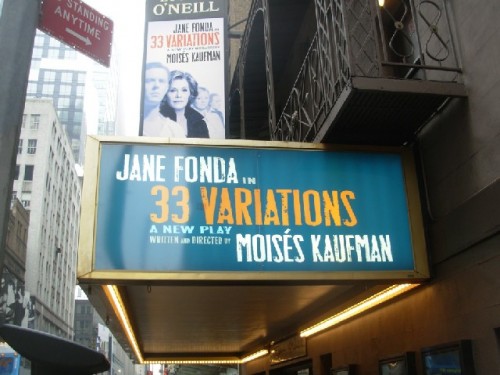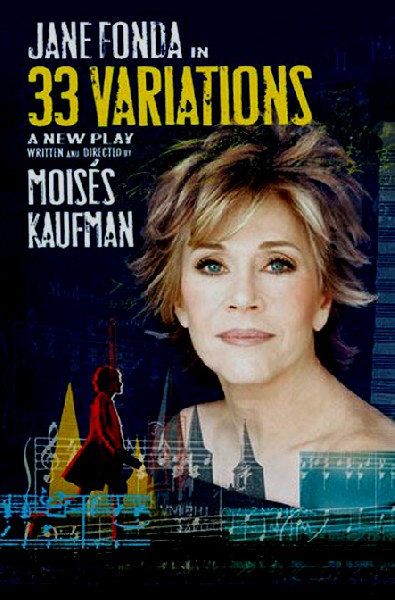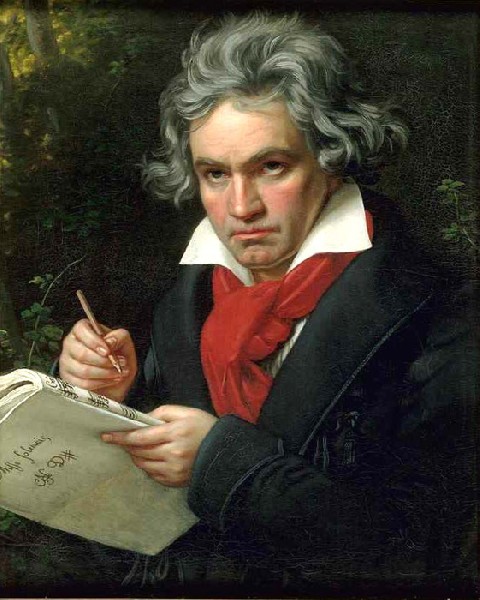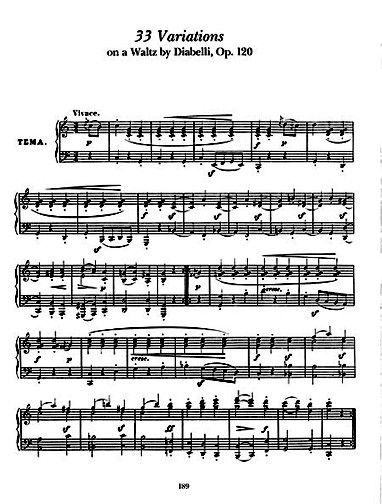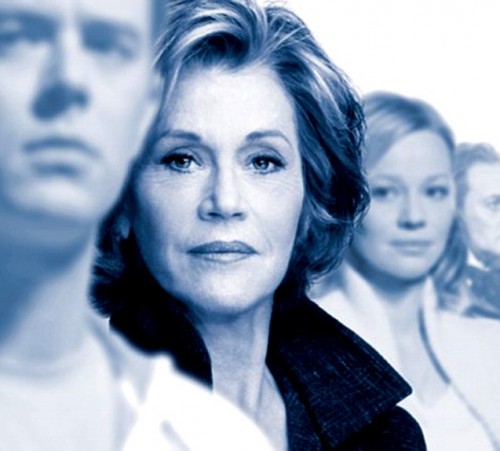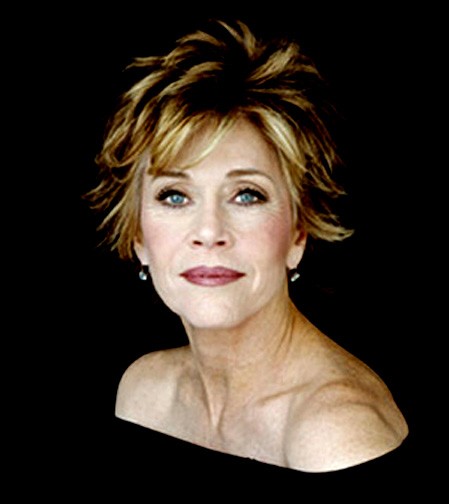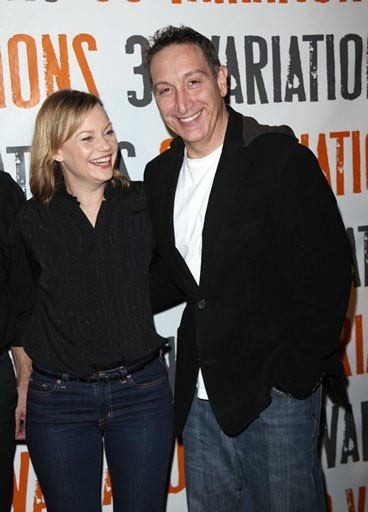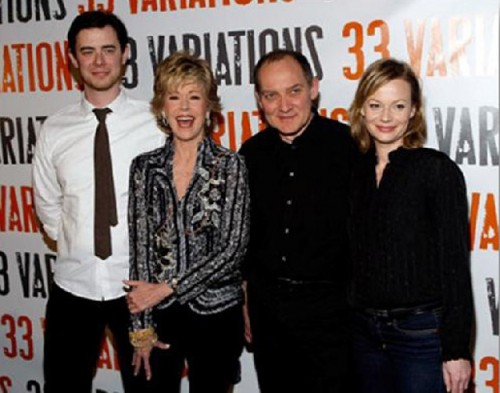Jane Fonda in 33 Variations
Return to Broadway After 46 Year Absence
By: Charles Giuliano - Mar 14, 2009
33 Variations
Written and Directed by Moises Kaufman
Music by Ludwig van Beethoven
Cast: Jane Fonda (Dr. Katherine Brandt), Samantha Mathis (Clara Brandt), Colin Hanks (Mike Clark), Don Amendolia (Anton Diabelli), Erik Steele (Anton Schindler), Zach Grenier (Ludwig van Beethoven), Susan Kellerman (Dr. Gertrude Ladenburger).
Scenic Design, Derek McLane; Costume Design, Janice Pytel; Lighting Design, David Lander; Sound Design, Andre J. Pluess; Pianist, Diane Walsh. Opening Night, March 9, 2009. Premiere, August 30, 2007 Arena Stage, Washington, DC
The Eugene O'Neill Theatre 236 West 45th Street, NY, NY ($67-$117). Through May 24.
One of the most anticipated performances of the New York theatre season was the return to Broadway, after a lapse of 46 years, of Jane Fonda starring as Dr. Katherine Brandt, a musicologist dying of Lou Gehrig's disease, in "33 Variations" written and directed by Moises Kaufman.
The feature stories on Fonda, which ran in advance of the opening night this past week, were kinder and more enthusiastic than the reviews which ranged from respectful to harsh. We attended the sold out matinee on Wednesday and noted individuals reading the reviews as well as engaging in lively discussions of the play during intermission as well as while exiting the theater. Many left in tears. It was a three hanky ending for all but the most hardened critics.
Yes, the play and performance of Fonda were flawed. But we found ourselves thoroughly absorbed by the drama which contrasted the parallel themes of the declining health of a musicologist and her ambition to solve the mystery of why the similarly declining and diseased composer, Ludwig van Beethoven, late in life, opted to become obsessed with writing 33 variations on a trivial waltz composed by the less than gifted music publisher Anton Diabelli. There is a third theme which explores how the brilliant scholar has the insight and patience to unravel the conundrum of the composer but appears unable to solve the riddle of relationships with her daughter and all who care for her.
While brilliant there is a coldness and flinty independence that makes of Fonda's Dr. Katherine Brandt a less than compelling character. We tend to admire more than care for her. In rejecting the efforts and concerns of her daughter Clara (Samantha Mathis) inadvertently the audience is put off as well. Dr. Brandt is independent, strong willed, and self sufficient. Both the character, and Fonda's performance, proves to be distant and unyielding. The focus on her scholarly goal, a final, ambitious, life and career summarizing project, allow for no distractions or emotions. Perhaps this is too apt a metaphor for Fonda herself as an artist, celebrity, and icon.
The decision to return to the stage at this point of her life (Born December 21, 1937) is an occasion for speculation and insight. Fonda is regarded as one of the finest actresses of her generation. Since 1960 she has appeared in 43 films although she announced her retirement in 1991. Fonda won Academy Awards in 1971 for "Klute" and in 1978 for "Coming Home." She has been nominated for other roles including Best Supporting Actress for "On Golden Pond," 1981, for which her father, Henry Fonda, who died several months later, won his only Oscar.
In a fascinating career she has had as many lives as a cat. From the 1968 sex kitten "Barbarella," directed by her then husband Roger Vadim (1965-1973), to Hanoi Jane (1972) to wife of political activist Tom Hayden (1973-1990) and a stint as trophy wife to billionaire Ted Turner (1991-2001).
With so much rich and varied professional and life experience we came to the theatre with great expectations. There is so much that she has to offer us. To many of our generation she is a paradigm of our aesthetic and political odyssey. She has often managed to be the very eye of the cultural hurricane and its zeitgeist. But where we anticipated passion and compassion it was disappointing to experience such distance and reserve. Perhaps, as F. Scott Fitzgerald proclaimed, indeed "The rich (and famous) are different from you and me."
Arguably, it was a fatal and vain conceit to assume that after a career of performing in front of a camera she would be able to command the stage. Her last play was "Strange Interlude" in 1963. During "33 Variations" it became all too evident that she simply lacked the technique to project herself to a live audience. We were close enough to observe her trim and fit figure but not the nuances of her well made up face under a perfect coif. Indeed, she seemed far too manicured for an aging and deteriorating academic. As Astrid observed there were no changes to her glamorous appearance between the first and second act to indicate the ravishment of the later stages of amyothropic lateral sclerosis. This was conveyed by props, a walker, and eventual wheelchair. Other than clenching her hands and stiffening body language there was too little indication of the progress of the disease.
Through the research of Dr.Brandt, however, we did learn about the creative process of the composer and his obsession for the seemingly trivial waltz of Anton Diabelli. This was the greatest collateral benefit of the Kaufman play. We were also seated close enough to much enjoy the playing of Diana Walsh who performed many of the Variations. The piano was set up just in front of the stage with her back to the audience.
Apparently, it took considerable effort for Dr. Brandt to gain access to the vast archive of Beethoven's works and letters in Bonn. Prior to leaving for Germany she is examined by a nurse and physical therapist, Mike Clark, played by Colin Hanks, the son of the actor, Tom Hanks. She is accompanied by her daughter Clara who wants to be in the examining room. The nurse explains that this is not allowed. Even after the grim diagnosis Dr. Brandt is determined to travel to Bonn and refuses to let Clara come along and look after her. .
There are too many coincidences in Kaufman's play. The first is that Clara and the nurse/ therapist, Mike, become an item. They later travel to Bonn to care for the declining Katherine. There is a second and even more absurd coincidence. It seems that the archivist in Bonn who deals with her, Dr. Gertrude Ladenburger (Susan Kellerman), had an aunt who died of Lou Gehrig's disease. Really, that's a stretch. What are the odds of that happening in real life? We have already been informed by Mike that it is an "orphan disease" meaning that there are too few patients to attract research and drugs for a cure or treatment. How convenient that Dr. Brandt is surrounded by individuals who know the symptoms of a rare and debilitating disease and how to provide hospice.
While Dr. Brandt struggles with declining health and the ongoing problems of a relationship with her daughter we find Beethoven (Zach Grenier), Diabelli (Don Amendolia), and Beethoven's biographer, Anton Schilndler (Erik Steele) clashing and clattering about. Their goings on tend to upstage and prove far more interesting than the bathos of Dr. Brandt. At the end of the first act there is a montage as we hear the same theme and arguments presented by three sets of voices. It was nicely nuanced.
As the play progressed we found ourselves absorbed by the mystery of the Variations. The action is strikingly contained within a superbly designed set by Derek McLane. He has created the mood of the archive with its metal shelves containing boxes of materials. Many of the individual sheets of music are projected as the two musicologists discuss the compositions as they are performed.A spot or stain on one sheet of music appears to have been caused by spilled soup. This is further conveyed in a scene in which Beethoven complains at being served a bowl of cold soup. The resultant tantrum is intended as a signifier of the creative persona. The soup and other romantic/ humanistic insights really engaged us with the music and its creative process. This was indeed the greatest pleasure and insight of the play.
As the climax of the drama Dr. Brandt delivers her paper and conclusions on the Variations. It is Fonda's compelling moment but also most false as it is pure Jane and not very Dr. Brandt. It is delivered, for example, with not a symptom of the disease that had apparently just killed her. This is conveyed as Dr.Brandt disappears and the speech is finished by her daughter dressed in the black of mourning. She is delivering the address as the final wish of her mother. There wasn't a dry eye in the house.
Despite mostly tepid reviews this rare appearance by Fonda on Broadway is sure to be sold out between now and the end of its brief runs on May 24. Let us hope that this success encourages Fonda to return to the stage in a more demanding and rewarding role. She has so much more to offer than this performance failed to deliver.

